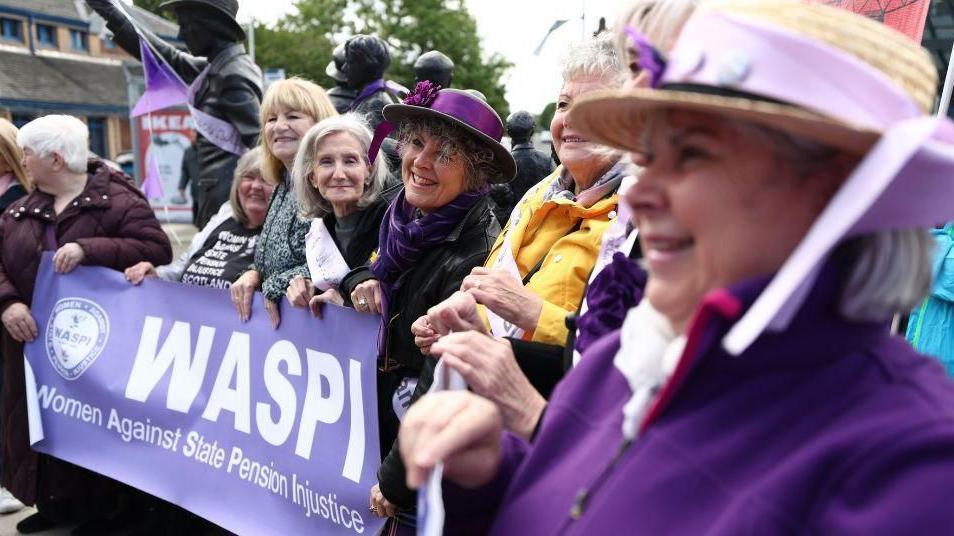Decision on women hit by pension age rise condemned

- Published
Plaid Cymru and the Welsh Liberal Democrats have strongly criticised the UK government for rejecting calls to pay compensation to women hit by changes to the state pension age.
Campaigners says 3.6 million women born in the 1950s were not properly informed of the rise in the state pension age to bring them into line with men.
Work and Pensions Secretary Liz Kendall apologised for a 28-month delay in sending letters informing them of the change, but rejected any kind of financial payouts.
Nine months ago, a parliamentary ombudsman recommended compensation of between £1,000 and £2,950 to each of those affected.
What is the row about women's pensions?
- Published18 December 2024
Fury as women hit by pension age rise denied payouts
- Published18 December 2024
The Welsh Lib Dems say it is a "day of shame" while Plaid Cymru politicians say many women across Wales will feel "let down" by Labour.
The Women Against State Pension Inequality (Waspi) group, which has been campaign on the issue since 2015, said the UK government's decision was an "insult".
Speaking on BBC Radio Wales Drive, Plaid Cymru MP Ann Davies said there was "total disbelief" when the announcement was made in the Commons.
"To be honest, I really couldn't believe it," she said. "In the chamber Liz Kendall gave her statement and, to be honest, it was stunned silence at the beginning and then people really realised what she was saying and what was coming and it was total disbelief".
The Caerfyrddin MP accused Labour of breaking "repeated promises" to support the WASPI women.
"They have an opportunity to do this and they have chosen not to do it."
'Heartless decision'
Liberal Democrat Welsh Affairs Spokesperson David Chadwick said: "Today is a day of shame for the Labour government."
The Brecon, Radnor and Cwm Tawe MP added: "For years, Liberal Democrats have pushed the government to fairly compensate Waspi women in line with the Ombudsman's recommendations.
"Today's heartless decision cannot be allowed to stand and we will be pressing ministers to give those affected the fair treatment they deserve."
The UK government says there was evidence that there was "considerable awareness" of the changes to the pension age, and sending letters earlier would not have made a difference to their ability to make retirement choices.
Also, that there was no evidence of "direct financial loss" resulting from the government's decision, UK ministers say.
Work and Pensions Secretary Liz Kendall added: "Given the vast majority of women knew the state pension age was increasing, the government does not believe paying a flat rate to all women at a cost of up to £10.5bn would be fair or proportionate to taxpayers."
Prime Minister Sir Keir Starmer said he understood the concern of the Waspi women, but had to take into account whether it was right "to impose a further burden on the taxpayer".
How has the pension age for women changed?
The modern state pension was introduced in 1948.
Men who had made enough National Insurance (NI) contributions received their state pension at 65 and women at 60.
However, in 1995 the then Conservative government introduced a timetable to make the age at which men and women start getting state pensions the same.
The state pension age for women would gradually rise to 65, between 2010 and 2020.
In 2010, the Conservative-Lib Dem coalition government decided to speed up the changes, to reduce the overall cost of the state pension.
The Pension Act 2011 brought forward the qualifying age of 65 for women to 2018.
In 2020, the state pension age for both men and women increased to 66.
Under current plans, the state pension age is set to rise again to 67 between 2026 and 2028, and to 68 between 2044 and 2046.
Read more about the row over pension changes for women born in the 1950s here.